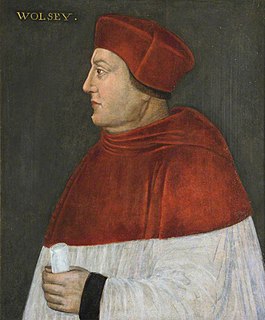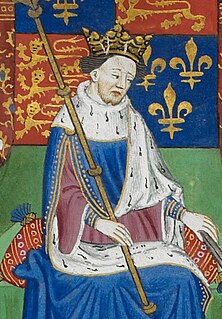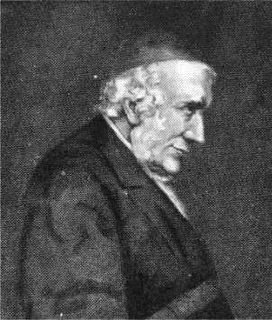Related Research Articles

Sir John Falstaff is a fictional character who appears in three plays by William Shakespeare and is eulogised in a fourth. His significance as a fully developed character is primarily formed in the plays Henry IV, Part 1 and Part 2, where he is a companion to Prince Hal, the future King Henry V of England. The eulogy for Falstaff is presented in Act II, Scene III of Henry V, where Falstaff does not appear as a character on stage, as enacted by Mistress Quickly in terms that some scholars have ascribed to Plato's description of the death of Socrates after drinking hemlock. By comparison, Falstaff is featured as the buffoonish suitor of two married women in The Merry Wives of Windsor.

Henry VII was King of England and Lord of Ireland from his seizure of the crown on 22 August 1485 until his death in 1509. He was the first monarch of the House of Tudor.

Thomas Wolsey was an English statesman and Catholic bishop. When Henry VIII became King of England in 1509, Wolsey became the king's almoner. Wolsey's affairs prospered and by 1514 he had become the controlling figure in virtually all matters of state. He also held important ecclesiastical appointments. These included the Archbishopric of York—the second most important role in the English church—and that of papal legate. His appointment as a cardinal by Pope Leo X in 1515 gave him precedence over all other English clergy.

William Shakespeare was an English playwright, poet and actor. He is widely regarded as the greatest writer in the English language and the world's greatest dramatist. He is often called England's national poet and the "Bard of Avon". His extant works, including collaborations, consist of some 39 plays, 154 sonnets, three long narrative poems, and a few other verses, some of uncertain authorship. His plays have been translated into every major living language and are performed more often than those of any other playwright. His works continue to be studied and reinterpreted.

Edward the Confessor was one of the last Anglo-Saxon English kings. Usually considered the last king of the House of Wessex, he ruled from 1042 to 1066.

Henry V, also called Henry of Monmouth, was King of England from 1413 until his death in 1422. Despite his relatively short reign, Henry's outstanding military successes in the Hundred Years' War against France made England one of the strongest military powers in Europe. Immortalised in Shakespeare's "Henriad" plays, Henry is known and celebrated as one of the greatest warrior-kings of medieval England.

Henry III, also known as Henry of Winchester, was King of England, Lord of Ireland, and Duke of Aquitaine from 1216 until his death in 1272. The son of King John and Isabella of Angoulême, Henry assumed the throne when he was only nine in the middle of the First Barons' War. Cardinal Guala declared the war against the rebel barons to be a religious crusade and Henry's forces, led by William Marshal, defeated the rebels at the battles of Lincoln and Sandwich in 1217. Henry promised to abide by the Great Charter of 1225, a later version of the 1215 Magna Carta, which limited royal power and protected the rights of the major barons. His early rule was dominated first by Hubert de Burgh and then Peter des Roches, who re-established royal authority after the war. In 1230, the King attempted to reconquer the provinces of France that had once belonged to his father, but the invasion was a debacle. A revolt led by William Marshal's son, Richard Marshal, broke out in 1232, ending in a peace settlement negotiated by the Church.

Henry VI was King of England and Lord of Ireland from 1422 to 1461 and again from 1470 to 1471, and disputed King of France from 1422 to 1453. The only child of Henry V, he succeeded to the English throne at the age of nine months upon his father's death, and succeeded to the French throne on the death of his maternal grandfather, Charles VI, shortly afterwards.

John Henry Newman was an English theologian, scholar and poet, first an Anglican priest and later a Catholic priest and cardinal, who was an important and controversial figure in the religious history of England in the 19th century. He was known nationally by the mid-1830s, and was canonised as a saint in the Catholic Church in 2019.

The House of Lancaster was a cadet branch of the royal House of Plantagenet. The first house was created when King Henry III of England created the Earldom of Lancaster—from which the house was named—for his second son Edmund Crouchback in 1267. Edmund had already been created Earl of Leicester in 1265 and was granted the lands and privileges of Simon de Montfort, 6th Earl of Leicester, after de Montfort's death and attainder at the end of the Second Barons' War. When Edmund's son Thomas, 2nd Earl of Lancaster, inherited his father-in-law's estates and title of Earl of Lincoln he became at a stroke the most powerful nobleman in England, with lands throughout the kingdom and the ability to raise vast private armies to wield power at national and local levels. This brought him—and Henry, his younger brother—into conflict with their cousin King Edward II, leading to Thomas's execution. Henry inherited Thomas's titles and he and his son, who was also called Henry, gave loyal service to Edward's son King Edward III.

Henry Aldrich was an English theologian, philosopher, and composer.

Shakespeare's sonnets are poems written by William Shakespeare on a variety of themes. When discussing or referring to Shakespeare's sonnets, it is almost always a reference to the 154 sonnets that were first published all together in a quarto in 1609. However, there are six additional sonnets that Shakespeare wrote and included in the plays Romeo and Juliet, Henry V and Love's Labour's Lost. There is also a partial sonnet found in the play Edward III.

Henry Edward Manning was an English prelate of the Roman Catholic church, and the second Archbishop of Westminster from 1865 until his death in 1892.

Samuel Wilberforce, FRS was an English bishop in the Church of England, and the third son of William Wilberforce. Known as "Soapy Sam", Wilberforce was one of the greatest public speakers of his day. He is now best remembered for his opposition to Charles Darwin's theory of evolution at a debate in 1860.

The Oxford Movement was a movement of high church members of the Church of England which eventually developed into Anglo-Catholicism. The movement, whose original devotees were mostly associated with the University of Oxford, argued for the reinstatement of some older Christian traditions of faith and their inclusion into Anglican liturgy and theology. They thought of Anglicanism as one of three branches of the "one, holy, catholic, and apostolic" Christian church. By the 1840s many participants decided that the Anglican Church lacked grace, and converted to Roman Catholicism.

Eavesdropping is the act of secretly or stealthily listening to the private conversation or communications of others without their consent in order to gather information.
Henry of Huntingdon, the son of a canon in the diocese of Lincoln, was a 12th-century English historian and the author of Historia Anglorum, as "the most important Anglo-Norman historian to emerge from the secular clergy". He served as archdeacon of Huntingdon. The few details of Henry's life that are known originated from his own works and from a number of official records. He was brought up in the wealthy court of Robert Bloet of Lincoln, who became his patron.

The House of Plantagenet was a royal house which originated from the lands of Anjou in France. The family held the English throne from 1154 to 1485, when Richard III died in battle.

The Coat of Arms of the Isle of Man, blazoned Gules three legs in armour flexed at the knee and conjoined at the thigh, all proper, garnished and spurred or, dates from the late 13th century. The present version dates from 12 July 1996. As the Isle of Man is a Crown dependency and the present Lord of Man is Queen Elizabeth II of the United Kingdom, the arms are more accurately described as the Arms of Her Majesty in right of the Isle of Man. The origin of the triskeles is obscure, but it appears to stem from the Scottish takeover of the island in 1265. The heraldic supporters are birds associated with the island, whilst the motto first appears on record in the 17th century.
Moral Inquiries on the Situation of Man and of Brutes is an 1824 book by Lewis Gompertz, an early animal rights advocate and vegan. In the book, Gompertz lays out a moral framework for the treatment of and obligations towards humans and other animals, arguing against the consumption of meat, milk, eggs, silk and leather, denouncing vivisection and arguing for aiding animals suffering in the wild.
References
- 1 2 Alter, J.-M. "Man, Henry". Oxford Dictionary of National Biography (online ed.). Oxford University Press. doi:10.1093/ref:odnb/17913.(Subscription or UK public library membership required.)